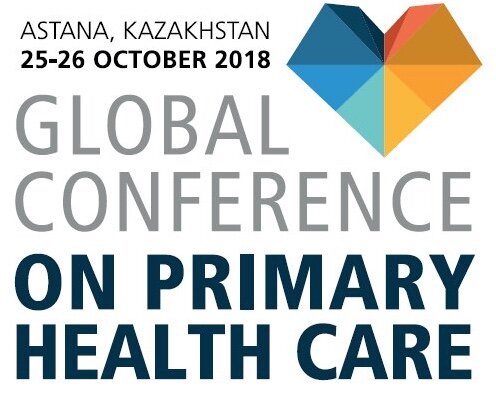UHC2030 hosted its annual UHC Day parliamentarian town hall to...
24 October 2018
Four key requests from civil society - read more!

On the eve of the Global Conference on Primary Health Care, 25-26 October 2018 in Astana, Kazakhstan, civil society partners urged governments and global leaders to realise a broad and inclusive movement for universal health coverage (UHC), calling for systematic attention to the needs of the most marginalised and vulnerable populations.
Nearly two hundred civil society organisations (CSOs), led by the Civil Society Engagement Mechanism for UHC2030 (CSEM), released a landmark statement reaffirming their commitment to form strategic partnerships and engage in collective advocacy with a common health agenda. The statement, shaped out of submissions from individuals and CSOs all over the world, reflects tangible steps and actions needed beyond the 40th anniversary of the Alma-Ata Declaration, the first international declaration underlining the importance of primary health care.
Through multiple interactive platforms, CSOs have come together to hold governments, development partners and the private sector accountable for their promises to strengthen primary health care through quality, access and equity.
Civil society, with broad representation including activists and religious groups, professional and community associations, health workers, patients and caregivers, people with disabilities, women and girls, and young and ageing populations, will collaborate more systematically at national, regional and global levels to ensure that the voices and needs of the most-affected populations that have been left farthest behind, hold power at the decision-making table.
The civil society statement complements the Astana Declaration which was launched at the conference, and makes four requests to national governments and development partners in order to accelerate progress.
1. Strengthen political leadership and governance. Civil society calls on government to develop and implement costed strategies with clear, time-bound actions for strengthening health care for all. Through inter-ministry coordination and multi-sectoral solutions that encompass collaboration with people and communities, governments and key partners must set and measure quality of care and safety standards, create an enabling regulatory environment for constructive private sector engagement, and engage in peer country learning.
2. Improve financing for health. The 2017 UHC global monitoring report estimates that almost 100 million people are pushed into extreme poverty each year because of out-of-pocket health expenses. Health financing should take into account not just efficiency but also quality, access and equity. Budget allocation and expenditure between different levels of care should be proportionate, user fees for essential health services abolished, and investment made in sustainable primary health care teams. Governments should ensure availability of facilities, equipment and drugs, and, in collaboration with stakeholders, strategize for sustainability and transition from external funding.
3. Enhance accountability. Civil society calls on government to improve quality of data, and, document those who are being left behind. To improve health governance, they should strengthen the role of parliamentarians and local governments to ensure oversight of public services and the private sector, ensuring transparency in priority-setting processes and implementing safeguards against corruption.
4. Advance country-led solutions. The statement further calls on development partners to improve their own coordination, aligning with existing systems and structures at country level and providing support in building primary health care data tracking mechanisms. For comprehensive people-centered services and care, development partners should promote and support community-based programmes and adopt a multi-sectoral approach, moving away from the vertical approach to health. Civil society partners urge the global community to move beyond cost-efficiency thinking in favor of high-quality and equity in health care delivery. In collaboration with countries, they should strategize on domestic resource mobilization, and consider the whole primary health care system and not just national income figures in transition from donor funding.
With the support of the UHC2030, CSEM is committed to ensuring continued advocacy for inclusive global health policies and actions moving on from Astana 2018. CSEM will continue to seek opportunities to engage in joint civil society advocacy for UHC, leading up to the United Nations High-Level Meeting (UN-HLM) in 2019, towards ensuring not only quality and access but equity on the road to UHC.
More UHC2030 News
A global health financing emergency threatens progress toward...
UHC2030 at HSR2024: Advancing equity and inclusion in health systems through civil society knowledge
UHC2030, in collaboration with the SUPPORT-SYSTEMS research...
